中考英语(9大词性)专题-介词
中考英语复习语法知识讲解(词性句子成分句子划分简单句结构)

中考英语语法知识讲解一、词性【实词】名词、代词、动词、形容词、副词、数词实词是指实在意义,能独立承担句子成分的词,实词有词形的变化。
【虚词】冠词、介词、连词、感叹词与实词相对,虚词没有实在意义,不能独立承担句子成分,虚词没有词形的变化。
1、名词(n.)表示人、事物、地点或抽象概念的名称。
[例]boy, morning, orange, clock, etc.2、代词(pron.)主要用来代替名词。
[例]who, she, you, it, etc.3、形容词(adj.)表示人或事物的性质或特征。
[例]good, white, orange, ugly, etc.4、数词(num.)表示数量或事物的顺序。
[例]one, two, three, hundred, etc.5、动词(v.)表示动作或状态。
[例]am, is, think, does, may, etc.6、副词(adv.)修饰动词、形容词、副词,说明时间、地点、程度等。
[例]now, often, slowly, home, hard, very, really, etc.7、冠词(art.)用在名词前,帮助说明名词。
[例]a, an, the.8、介词(prep.)表示它后面的名词或代词与其他句子成分的关系。
[例]in, on, at, from, above, under, behind, with, without, to, etc.9、连词(conj.)用来连接词、短语或句子。
[例]and, or, before, when, while, after, as soon as, if, unless, until, because, so, though, but, even if, even though, as if, etc.10、感叹词(interj.)表喜、怒、哀、乐等感情。
[例]oh, well, hi, hello, etc.二、句子成分1、主语句子所要说的人或事物,回答是“谁”或者“什么”。
英语中考语法 介词 课件 (共103张PPT)

for for+一段时间,达……之久(表示经过了多少时间),可以和 一般现在时、过去时、将来时连用,但经常和完成时连用。
from
用于一般过去、一般现在或一般将来时
since
自从……以来(表示从以前某时一直到现在仍在继续)
since+时间点,主要用于完成时或完成进行时
① We go to school from Monday to Friday. (from…to…“从…到…”,不能用于完成时) ② I have been sick since yesterday.我从昨天起就病了。(强调一直病到现在) ③ The doctor has saved a lot of lives since he became a doctor.
A. during B. after C. for D. in
a few
( D )My brother joined the army last year. A. on B. by C. at D. in
September
( A )— How soon will we get the offer from a new high school? — ________about two months.
after+时间点,用于将来时,表“在……以后”
① I went to the cinema befroe 7 p.m. yesterday. ② After two days, the police finally found the lost girl.
两天之后,警方终于找到那个走失的女孩。 ③We are leaving for Shanghai after two o'clock.
中考英语复习词性与句子成分句型
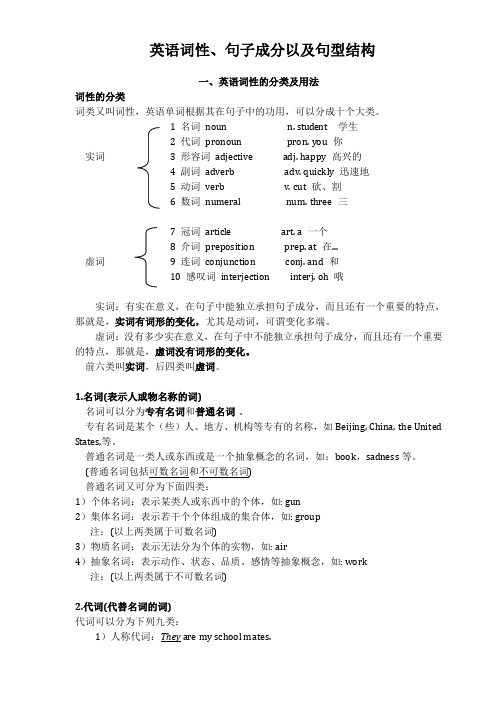
英语词性、句子成分以及句型结构一、英语词性的分类及用法词性的分类词类又叫词性,英语单词根据其在句子中的功用,可以分成十个大类。
1 名词noun n. stud ent 学生2 代词pronoun pron. you 你实词 3 形容词adjective adj. happy 高兴的4 副词adverb adv. quickly 迅速地5 动词verb v. cut 砍、割6 数词numeral num. three 三7 冠词article art. a 一个8 介词preposition prep. at 在...虚词9 连词conjunction conj. and 和10 感叹词interjection interj. oh 哦实词:有实在意义,在句子中能独立承担句子成分,而且还有一个重要的特点,那就是,实词有词形的变化,尤其是动词,可谓变化多端。
虚词:没有多少实在意义,在句子中不能独立承担句子成分,而且还有一个重要的特点,那就是,虚词没有词形的变化。
前六类叫实词,后四类叫虚词。
1.名词(表示人或物名称的词)名词可以分为专有名词和普通名词.专有名词是某个(些)人、地方、机构等专有的名称,如Beijing, China, the United States,等。
普通名词是一类人或东西或是一个抽象概念的名词,如:book,sadness等。
(普通名词包括可数名词和不可数名词)普通名词又可分为下面四类:1)个体名词:表示某类人或东西中的个体,如: gun2)集体名词:表示若干个个体组成的集合体,如: group注:(以上两类属于可数名词)3)物质名词:表示无法分为个体的实物,如: air4)抽象名词:表示动作、状态、品质、感情等抽象概念,如: work 注:(以上两类属于不可数名词)2.代词(代替名词的词)代词可以分为下列九类:1)人称代词:They are my school mates.2)物主代词:Our friends have great concern for each other.3)反身代词:Take good care of yourselves.4)相互代词:We shoul d help each other.5)指示代词:Who are these peopl e?6)疑问代词:What are you d oing?7)关系代词:She married Li Lei, who is a stud ent too.8)连接代词:Do you know who did it?9)不定代词:Do you know anything about it?代词是非常活跃的词,特别是不定代词,比较复杂,我们要熟练掌握。
初中英语中考常用九类词性的定义及归纳

初中常用的9类词性的定义及归纳词类又叫词性,英语单词根据其在句子中的功用,可以分成十个大类。
1.名词noun n. student 学生2.代词pronoun pron. you 你3.形容词adjective adj. happy 高兴的4.副词adverb adv. quickly 迅速地5.动词verb v. cut 砍、割6.数词numeral num. three 三7.冠词article art. a 一个8.介词preposition prep. at 在...9.连词conjunction conj. and 和10.感叹词interjection interj. oh 哦前六类叫实词(能够单独充当句法成分,有词汇意义和语法意义的是实词),后四类叫虚词(不能充当句法成分,没有词汇意义只有语法意义)。
一、名词1.名词复数的规则变化2.名词的格在英语中有些名词可以加“’s”来表示所有关系,带这种词尾的名词形式称为该名词的所有格,如:a teacher’s book。
3.名词所有格的规则如下:1)单数名词词尾加“’s”,复数名词词尾没有s,也要加“’s”,如the boy’s bag 男孩的书包,men’s room 男厕所。
2)若名词已有复数词尾-s ,只加“’”,如:the workers’ struggle工人的斗争。
二、代词大多数代词具有名词和形容词的功能。
英语中的代词,按其意义、特征及在句中的作用分为:人称代词、物主代词、指示代词、反身代词、相互代词、疑问代词、关系代词、连接代词和不定代词九种。
1.人称代词的用法:I saw her with them,at least,I thought it was her.我看到她和他们在一起,至少我认为是她。
(her做宾语,them做介词宾语,her作主补)a. -- Who broke the vase?--谁打碎了花瓶?b. -- Me.--我。
初中英语介词用法总结
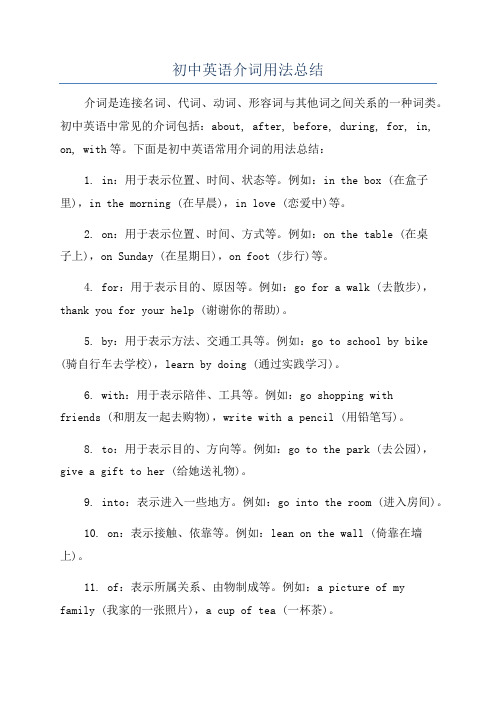
初中英语介词用法总结介词是连接名词、代词、动词、形容词与其他词之间关系的一种词类。
初中英语中常见的介词包括:about, after, before, during, for, in, on, with等。
下面是初中英语常用介词的用法总结:1. in:用于表示位置、时间、状态等。
例如:in the box (在盒子里),in the morning (在早晨),in love (恋爱中)等。
2. on:用于表示位置、时间、方式等。
例如:on the table (在桌子上),on Sunday (在星期日),on foot (步行)等。
4. for:用于表示目的、原因等。
例如:go for a walk (去散步),thank you for your help (谢谢你的帮助)。
5. by:用于表示方法、交通工具等。
例如:go to school by bike (骑自行车去学校),learn by doing (通过实践学习)。
6. with:用于表示陪伴、工具等。
例如:go shopping withfriends (和朋友一起去购物),write with a pencil (用铅笔写)。
8. to:用于表示目的、方向等。
例如:go to the park (去公园),give a gift to her (给她送礼物)。
9. into:表示进入一些地方。
例如:go into the room (进入房间)。
10. on:表示接触、依靠等。
例如:lean on the wall (倚靠在墙上)。
11. of:表示所属关系、由物制成等。
例如:a picture of myfamily (我家的一张照片),a cup of tea (一杯茶)。
12. with:表示伴随、具有。
例如:a girl with long hair (一个长发的女孩),a book with pictures (一本有图片的书)。
(英语)中考英语介词专题训练答案及解析

(英语)中考英语介词专题训练答案及解析一、初中英语介词1.—When is the Art Festival party?—It's seven o'clock the evening of November 18th.A. at;inB. at;onC. on;inD. in;on【答案】 B【解析】【分析】句意:艺术节晚会在什么时候?——它在11月18日晚上7点钟。
at+具体的时间点,on+某天,或者跟具体某天的上午或下午,in +年份,季节,月份,或者泛指的上下午等。
seven o'clock是时间点,故加介词at,the evening of November 18th.表示具体某天的上午或下午(晚上),故加介词on,故答案为B。
【点评】本题考查时间介词辨析,at+具体的时间点,on+某天,或者跟具体某天的上午或下午,in +年份,季节,月份,或者泛指的上下午等。
2.—Shall I help you ________ the street, Grandpa?—No, thanks. I can manage it myself.A. onB. withC. acrossD. along【答案】 C【解析】【分析】句意:——爷爷,我可以帮助你过马路吗?——不用,谢谢。
我自己就行。
on在……上;with和……一起;across 横跨;along沿着,根据上下文的联系可知此处是帮助爷爷过马路,故选C。
【点评】考查介词。
掌握介词的使用规律,根据语境确定所使用的介词。
3.—Shall we stop and wait for others?—Sounds good. I think they will catch up______ a few minutes.A. duringB. afterC. forD. in【答案】 D【解析】【分析】句意:——要不我们停下来等别人好吗?——听起来不错。
李军中考英语词性讲义

李军中考英语词性讲义一、名词1. 名词是指人名、地名、机构、国家、事物名称和抽象概念等。
2. 具体名词:指具体的、可以把握、可以感受到的事物,如大象、教室等;3. 抽象名词:指抽象的、看不见、摸不着的事物,如爱情、和平等;4. 专有名词:指专指某一个人、地方、标志等,如维也纳、麦克阿瑟等;二、动词1. 动词是表示动作的词,包括实义动词和系动词。
2. 实义动词:指能够表示实际意义的动作,如run 、sing 等;3. 系动词:指表示存在状态、感情状态或人生状态等,如be 、look 等。
三、形容词1. 形容词是描述名词的词,表示一个人或物的特征、状态、品质等,如 old 、beautiful 等。
2. 比较级:用来比较两件事物或两个人,如better、farther 等;3. 最高级:形容词放在最高级前,用来比较三者以上的事物或人,如the best、the prettiest 等;四、副词1. 副词是用来修饰动词、形容词、整句话的一种词,如quietly 、soon 等。
2. 时间副词:表示时间的副词,如often 、already 等;3. 地点副词:表示地点的副词,如here、there 等;4. 程度副词:表示程度的副词,如quite 、very 等。
五、介词1. 介词是表示特定关系的词,后面接名词短语或动词,如in、for等。
2. 时间介词:指表示时间的介词,如at 、on 等;3. 地点介词:指表示地点的介词,如in 、at 等;4. 方式介词:表示方式的介词,如by 、in 等。
六、连词1. 连词是把句子中的部分文字连接起来,使句子顺语的词,如and 、but 等。
2. 并列连词:把相同重要程度的句子或分句迅速地连接起来,以表示并列关系,如and 、either…or 等;3. 递进连词:指表示递进关系的连词,如not only…but also;4. 转折连词:表示转折关系的连词,如yet 、but 等。
英语中常用词性
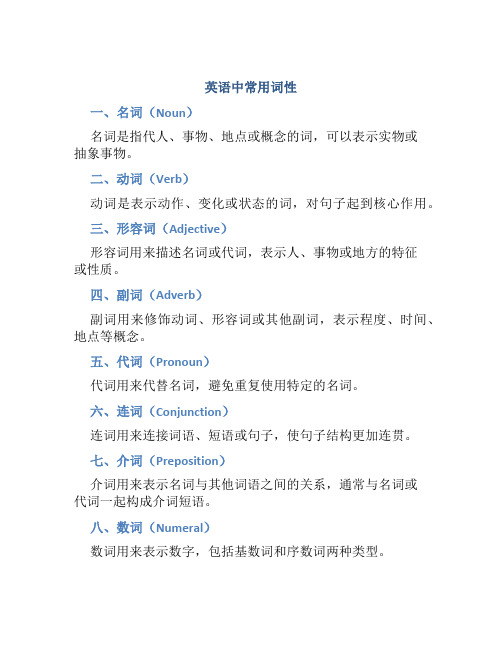
英语中常用词性
一、名词(Noun)
名词是指代人、事物、地点或概念的词,可以表示实物或
抽象事物。
二、动词(Verb)
动词是表示动作、变化或状态的词,对句子起到核心作用。
三、形容词(Adjective)
形容词用来描述名词或代词,表示人、事物或地方的特征
或性质。
四、副词(Adverb)
副词用来修饰动词、形容词或其他副词,表示程度、时间、地点等概念。
五、代词(Pronoun)
代词用来代替名词,避免重复使用特定的名词。
六、连词(Conjunction)
连词用来连接词语、短语或句子,使句子结构更加连贯。
七、介词(Preposition)
介词用来表示名词与其他词语之间的关系,通常与名词或
代词一起构成介词短语。
八、数词(Numeral)
数词用来表示数字,包括基数词和序数词两种类型。
九、感叹词(Interjection)
感叹词用来表示强烈的情感或感叹,通常独立成句。
以上是英语中常用的九种词性,它们在句子中扮演不同的
角色,共同构成了丰富多彩的英语语言。
在学习和运用英语时,了解每种词性的特点和用法对提高语言表达能力至关重要。
中考英语语法专题详解三:介词、连词

中考英语语法专题详解三:介词、连词介词、连词是英语中使用的特别多的,那么我平常是怎么的用法呢,下面就是我给大家带来的中考英语语法专题详解三:介词、连词,盼望能关心到大家!介词、连词一、介词1. 介词概述:介词表示它与后面的名词或代词与其他(句子)成分的关系。
介词是虚词,不能单独做句子成分。
介词在英语中用法很活,也无肯定规律可循。
在学校范围内还应学一个记住一个,特殊是那些和动词的特别搭配。
2. 常用介词的意义和用法。
⑴ 时间或地点介词in、on、at的用法区分:表示时间时, in表示在一段时间里(在将来时句子中则表示在一段时间之后), on表示在详细的某一天或者某天的上下午等, at 表示在某个时刻或者瞬间;表示地点时, in表示在某个范围之内, on表示在某个平面上或与一个(面相)接触,at则表示在某个详细的场所或地点。
如:He was born on the night of May 10th.I usually get up at 7:00 in the morning.His glasses are on the desk.My brother is at the bus stop.⑵ after与in表示时间的用法区分:“after+(详细时刻/从句)”表示“在时刻之后”常用于一般过去时态;“in+(一段时间)”表示“在(多久)之后”,常用于将来时态。
如:He said that he would come back after 6:00.My father is coming back from Astralia in about a month.⑶ since与for表示时间的用法区分:“since+(详细时刻/that-从句)”表示“自从起始终到现在”,“for +(一段时间)”表示“持续一段时间”,都常用于完成时态;如:My father has worked in this factory since 1970.My father has worked in this factory for over 30 years.⑷ by、in与with表示方式的用法区分:都可以表示“工具、手段”,但是by主要表示“乘坐”某个交通工具或“以方式”,在被动句中可以表示动作的执行者;in表示“使用”某种语言/文字,with表示“使用”某个详细的工具、手段。
2024年中考英语高频核心词汇(按词性划分)--for阅读完形
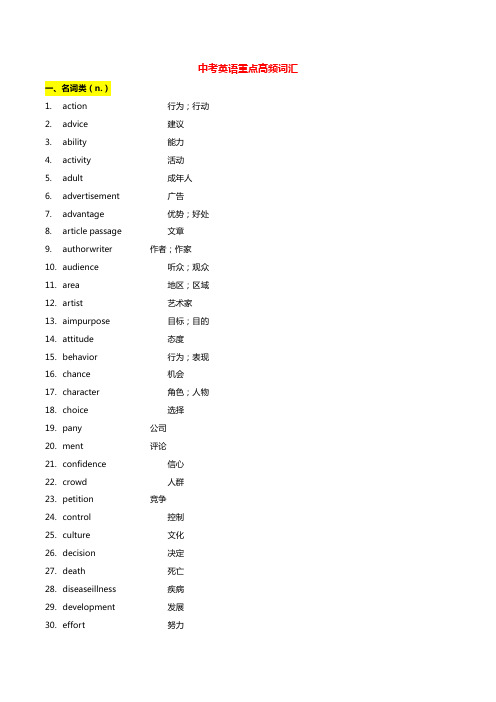
中考英语重点高频词汇一、名词类(n.)1.action 行为;行动2.advice 建议3.ability 能力4.activity 活动5.adult 成年人6.advertisement 广告7.advantage 优势;好处8.article passage 文章9.authorwriter 作者;作家10.audience 听众;观众11.area 地区;区域12.artist 艺术家13.aimpurpose 目标;目的14.attitude 态度15.behavior 行为;表现16.chance 机会17.character 角色;人物18.choice 选择19.pany 公司20.ment 评论21.confidence 信心22.crowd 人群23.petition 竞争24.control 控制25.culture 文化26.decision 决定27.death 死亡28.diseaseillness 疾病29.development 发展30.effort 努力31.effectinfluence 影响32.engineer 工程师33.examtest 考试34.exercise 运动;练习35.experiment 实验36.experience 经历;经验37.energy 能量;精力38.environment 环境39.event 事件;公开活动40.friendship 友情;友谊41.flight 飞行;航班42.habit 习惯rmation 信息44.invention 发明(物)45.invitation 邀请46.lie 谎言47.lesson 课;教训;道理48.lecturespeech 讲座;演讲49.medal 奖牌50.member 成员51.message 消息;留言52.magazine 杂志53.methodway 方法54.nature 自然55.newspaper 报纸56.opinion 意见;观点57.order 顺序;订单;命令58.pain 痛苦59.performance 表演;表现60.poempoet 诗歌;诗人61.post 帖子62.poster 海报63.population 人口64.purpose 目的65.price 价格;价钱66.prize 奖项;奖67.result 结果68.relationship 关系69.research 调查70.review 评论;复习71.sciencescientist 科学科学家72.secret 秘密73.sign 标识牌;指示牌74.situation 情形;情况75.skill 技能76.study 学习;研究77.society 社会78.spirit 精神79.space 太空;空间80.stage 舞台81.storeshop 商店82.survey 研究;调查问卷83.success 成功84.surprise 惊奇;惊讶;惊喜85.system 系统86.task 任务87.tear 眼泪88.teenager 青少年89.thought 想法;思考90.view 观点;风景;视野91.visitor 游客;访客92.universitycollege 大学93.universe 宇宙94.work(s) 工作;作品95.website 网站二、动词类(v.)1.advise 建议2.agreedisagree 同意/不同意3.allow 允许4.accept 接受5.achieve 实现;达到6.affect 影响7.argue 争论;辩论8.appear 出现;似乎9.avoid 避免10.attend 参加;出席11.book 预订12.change 改变13.choose 选择14.pletefinish 完成15.continue 继续16.municate 交流17.consider 认为;考虑18.create 创造;创新19.decide 决定20.depend 依靠;依赖21.describe 描述22.discover 发现23.encourage 鼓励24.expect 期望;指望25.failsucceed 失败成功26.follow 跟随;跟着27.guide 指导;引导28.hold 举行;举办29.hug 拥抱30.hurt 伤害31.improve 提高32.imagine 想象33.increase 提升;提高34.infer 推断35.invite 邀请36.invent 发明37.influence 影响38.introduce 介绍39.knock 敲门40.lie 说谎(lieliedlied);平躺(lielaylain)lying41.mention 提到;提及42.nod 点头43.obey 遵守anize 组织45.order 命令;下订单46.protect 保护47.prefer 更喜欢48.provide 提供49.punish 惩罚50.refer to 指代;指的是51.refuse 拒绝52.realize 意识到;实现53.receive 收到54.reduce 减少55.remind 提醒;想起56.respect 尊重57.save 节约;节省58.search 查找;搜寻59.seem 似乎60.shake 摇(头);摇摆61.shout 大喊;大叫62.show 表明;表现63.sigh 叹息64.solve 解决65.study 研究66.support 支持67.understand 理解68.wonder 想知道三、形容词、副词类(adj./adv.)1.afraid 害怕的2.alone 独自的3.annoyed 生气的;恼怒的4.bored 烦的;无聊的5.certain 确定的(sure)6.mon 常见的;相同的(have...in mon)7.confident 自信的;有信心的8.convenient 方便的;便利的9.dangerous 危险的10.embarrassed 尴尬的11.excited 激动的;兴奋的12.familiar 熟悉的13.famous 著名的;出名的14.foreign 外国的15.frightened 害怕的;惊恐的16.legalillegal 合法的非法的17.local 当地的18.necessary 必需的;必要的19.nervous 紧张的20.terrible 糟糕的;可怕的21.tired 累的;困的22.online 线上的23.own 自己的24.obvious 明显的25.ordinary 普通的26.patient 耐心的27.perfect 完美的28.pleased 开心的;满意的29.polite 有礼貌的30.popular 受欢迎的;流行的31.quiet 安静的32.relaxed 放松的33.satisfied 满意的34.silent 安静的;寂静的35.similar 相似的36.social 社会的;社交的37.suitable 合适的38.whole 全部的;整体的39.widewidely 宽的;广泛的40.wise 睿智的;聪明的41.worried 担心的;担忧的42.quitevery 很;相当地43.actually 事实上44.accurately 准确地45.certainly 确定地;一定地46.correctly 正确地47.pletely 完全地48.directly 直接地49.exactly 准确地50.fortunately 幸运地51.hardly 几乎不52.nearly 接近;几乎53.really 真正地;真地54.recently 最近;近来55.suddenly 突然地四、介词、连词类(prep./conj.)1.of A of B: B的A2.between 在......(两者)之间3.among 在......(多者)之间4.during 在......期间5.as ①作为② =because 因为... ③=when 当...6.on ①在...上面;② =about 关于③be on开着的;进行着的(状态)7.by ①by sb/sth被某人/物②by the river 在河边③by car/bus通过...④by doing通过做某事8.to ①to sb.给某人② to do sth. 为了做某事③ to doing sth.(搭配中的介词)9.with ①with sb和某人;② with sth: 用某物(with a pen);有了某物(with money);带着某物(with a smile)10.except 除了......11.althoughthough 虽然;尽管12.but ①但是②除了(have no choice but..) ③not...but.... 不是...而是...13.besides 除此之外;此外14.if ①如果(状语从句)②是否(宾语从句)15.unless 除非16.until 直到(not...until 直到...才...)17.since ①自从②既然;因为18.still ①仍然②静止的19.while ① =when: 当...时候②表前后的对比:然而③一会儿(after a while)20.however 然而(=but)21.therefore 因此(=so)。
中考介词归纳总结

中考介词归纳总结在中考中,介词是一个非常重要且常考的语法知识点。
介词在句子中起连接作用,表达时间、地点、方式、原因等关系。
掌握介词用法对于理解和运用英语至关重要。
本文将对中考所涵盖的常见介词进行归纳总结。
一、时间介词1. on:表示某一天或某一天的上午、下午、晚上等特定时间。
例:I will have a meeting on Monday.2. at:表示具体的时间点或特定的时刻。
例:We will meet at 9 o'clock.3. in:表示某一年、月、季节、时间段等。
例:She was born in 2005.例:We usually go swimming in summer.4. during:表示在某一段时间内。
例:He read a book during his summer vacation.二、地点介词1. at:表示具体的地点。
例:She is waiting for you at the bus station.2. on:表示表面或某物之上。
例:There is a book on the table.3. in:表示在某个范围、区域、国家或大洲内。
例:We live in a small town.4. to:表示朝向、方向。
例:He went to the library.三、方式介词1. by:表示通过某种交通方式或手段。
例:I usually go to school by bus.2. with:表示伴随、陪同。
例:She walks to school with her friends.3. in:表示用某种方式或手段。
例:He communicated with her in English.四、原因介词1. for:表示目的、原因或理由。
例:He went to the store for some milk.2. because of:表示因为。
中考英语语法总复习(精华版)
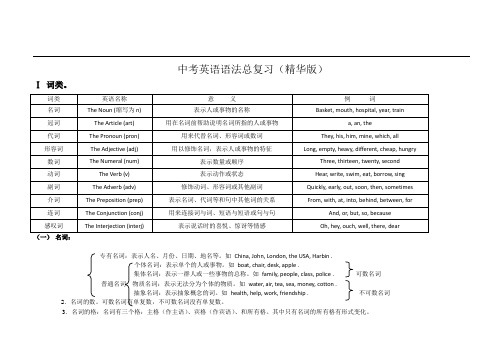
中考英语语法总复习(精华版)Ⅰ词类。
专有名词:表示人名、月份、日期、地名等。
如China, John, London, the USA, Harbin .个体名词:表示单个的人或事物。
如boat, chair, desk, apple .集体名词:表示一群人或一些事物的总称。
如family, people, class, police . 可数名词普通名词物质名词:表示无法分为个体的物质。
如water, air, tea, sea, money, cotton .抽象名词:表示抽象概念的词。
如health, help, work, friendship . 不可数名词2.名词的数。
可数名词有单复数,不可数名词没有单复数。
3.名词的格:名词有三个格:主格(作主语)、宾格(作宾语)、和所有格。
其中只有名词的所有格有形式变化。
(二)冠词1.定冠词-the .○1特指某(些)人或某(些)事物。
The students are very good.○2说话人与听话人都知道的人或事物。
Where is the toilet ?○3重复提到上文的人或事物。
I have a cat , the cat is white and black .○4表示世界上独一无二的事物。
The moon moves around the earth .○5形容词最高级和序数词前和表示方位的名词前。
I am the oldest . He is the first to school . I live in the south .○6乐器的名称前常用定冠词-the 。
I like playing the piano / violin .○7和某些形容词连用,使形容词名词化,代表某一类人。
We should help the poor .○8放在某些专有名词前。
We will go to visit the Great Wall next week . the people’s Republic of China .○9放在姓氏的复数形式前,表示全家人或夫妇两人。
词性--介词

词性--介词介词(prep.):表示它后面的名词或代词与其他句子成分的关系。
如in, on, from, above, behind1、介词的主要用法:介词是一种虚词,不能独立使用。
介词之后一般有名词或代词(宾格..)或相当于名词的其他词类、短语或从句作它的宾语,即构成介词短语。
有些介词是由两个以上的词构成的短语介词,如:out of(从…中出来), because of(因为), away from(距离…), on top of(在…顶上), ever since(自从…), next to(在…隔壁), according to(根据…), in front of(在…前方)等。
2)above在…前, about在…附近, across在…对面, after在…后面, against 倚着..., along在…近旁, among在…中间, around在…周围, round在….周围, at在…处, before 在...前, behind在...后, below低于..., beside在...旁边, between在...之间, by在...旁, down在...下面, from来自..., in在...里面, inside在...里面, near靠近..., of在...之中, on在...上面, out of在...之外, outside在....外面, over在....上方, under在...下方, up在...上面, on top of在...顶部, in靠近..., in the middle of在...的中间, at the end of在...的末端,等等。
across横越..., against对抗..., along沿着..., around绕着..., round环绕..., at朝着..., behind向…后面, etween…and…从…到...,by路过/通过..., down向…下, for向..., from从/离..., in进入..., into进入..., inside到...里面, near接近..., off脱离/除..., on向...上, out of 向...外, outside向....外, over跨过..., past经过/超过..., through穿过..., to向/朝..., towards朝着..., on to到...上面, onto到...上面, up向...上, away from远离...about大约..., after在…以后, at在… (时刻), before在…以前, by到…为止, during 在…期间, for有…(之久), from从…(时)起, in在(上/下午);在(多久)以后, on在(某日), past过了…(时), since自从…(至今), through 贯穿…(期间), till直到…时, until直到…时, to到(下一时刻), ever since从那时起至今,at the beginning of在...开始时,at the end of在...末, in the ...当中,at the time of在...时as作为/当作..., by用/由/乘坐/被..., in用…(语言), like与…一样, on骑(车)/徒(步),通过(收音机/电视机), over通过(收音机), through通过..., with用(材料),用(手/脚/耳/眼),without没有…about关于..., except除了…, besides除了…还... for对于/就…而言, in在…(方面), of…的,有关..., on关于/有关..., to对…而言, towards针对..., with就…而言其它介词:【目的介词】for为了..., from防止…, to为了…【原因介词】for因为..., with由于…, be cause of因为...【比较介词】as与…一样,like象…一样,than比...,to与…相比, unlike与…不同【伴随/状态介词】against和…一起(比赛),at在(上班/休息/上学/家,etc.),in穿着…(衣服/颜色),into变成...,on在(值日), with与…一起,有/带着/长着..., without没有/无/不与…一起3、介词短语的句法作用:介词短语相当于一个形容词或副词,可用作状语、定语和表语。
2023年中考英语语法:介词和动词短语课件

单项选择
( 2020·天津)
02 For my fifth birthday, my mother baked me a cake ____ a monkey.
A. at the mercy of B. beyond the reach of C. in the shape of D. on the side of
What Makes You Beautiful One Direction
听歌填词
Everyone else __i_n__ the room can see it Everyone else but you Baby you light _u__p__ my world like nobody else The way that you flip your hair gets me overwhelmed But when you smile __a_t__ the ground it ain't hard to tell You don't know You don't know you're beautiful
介词的功能
1. 拓展形容词
the boy under the tree
树下的男孩
词典中没有一个形容词表示 “在树下的”, 所以, 介词+名词 应运而生。
介词的功能
2. 拓展动词
The boy is looking for his book.
男孩在找他的书。
Look 本身没有 “寻找” 的含义,但是 加上介词for以后,连接了动词和名词 拓展了动词的含义。
初/中/语/法/系/列/课
介词和动词短语
主讲人:
知识清单
外研版英语中考英语常见介词最全总结

外研版英语中考英语常见介词最全总结一、初中英语介词1.— Is this Mike's dictionary?— No, it's mine. The thick one on the desk is .A. hisB. yoursC. hersD. theirs【答案】 A【解析】【分析】句意:——这是迈克的字典吗?——不,是我的。
桌子上最厚的那个是他的。
A他的,B你的,C,她的,D他们的,根据Is this Mike's,可知此处指代第三人称单数表示男性,故用his,故选A。
【点评】考查名词性物主代词辨析,注意指代第三人称单数表示男性用his的用法。
2.—Do you have this T-shirt in a different color?—I'm afraid not. It only comes red.A. ofB. inC. for【答案】 B【解析】【分析】句意:——你有不同颜色的这件t恤吗?——恐怕没有。
只有红色。
根据T-shirt in a different color,可知是in+颜色,故选B。
【点评】考查介词辨析,注意辨别介词of、in和for 的用法。
3.My English teacher always comes into the classroom ____a smile.A. byB. forC. onD. with【答案】 D【解析】【分析】句意:我英语老师总是带着微笑进入教室。
on "在……之上、在……时候";by "通过、被、由";for"为、为了、对";with "用、带着、和……一起",四者都是介词;表示老师面带微笑进入教室,用with,表伴随,故答案选D。
【点评】考查介词辨析,注意识记with的用法。
4.Beijing Expo 2019 opened to the public ________ 29th April. It will last over five months.A. atB. inC. onD. of【答案】 C【解析】【分析】句意:2019北京世博会于4月29日向公众开放。
人教版中考英语中考英语总复习 介词考点解析(Word版附答案)
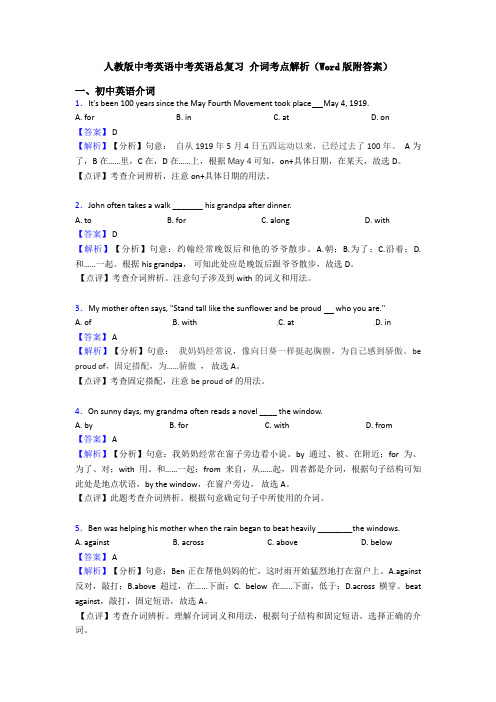
人教版中考英语中考英语总复习介词考点解析(Word版附答案)一、初中英语介词1.It's been 100 years since the May Fourth Movement took place May 4, 1919.A. forB. inC. atD. on【答案】 D【解析】【分析】句意:自从1919年5月4日五四运动以来,已经过去了100年。
A为了,B在……里,C在,D在……上,根据May 4可知,on+具体日期,在某天,故选D。
【点评】考查介词辨析,注意on+具体日期的用法。
2.John often takes a walk _______ his grandpa after dinner.A. toB. forC. alongD. with【答案】 D【解析】【分析】句意:约翰经常晚饭后和他的爷爷散步。
A.朝;B.为了;C.沿着;D.和……一起。
根据his grandpa,可知此处应是晚饭后跟爷爷散步,故选D。
【点评】考查介词辨析。
注意句子涉及到with的词义和用法。
3.My mother often says, "Stand tall like the sunflower and be proud who you are." A. of B. with C. at D. in【答案】 A【解析】【分析】句意:我妈妈经常说,像向日葵一样挺起胸膛,为自己感到骄傲。
be proud of,固定搭配,为……骄傲,故选A。
【点评】考查固定搭配,注意be proud of的用法。
4.On sunny days, my grandma often reads a novel ____ the window.A. byB. forC. withD. from【答案】 A【解析】【分析】句意:我奶奶经常在窗子旁边看小说。
by通过、被、在附近;for为、为了、对;with用、和……一起;from 来自,从……起,四者都是介词,根据句子结构可知此处是地点状语,by the window,在窗户旁边,故选A。
2018中考英语知识点:介词短语应用
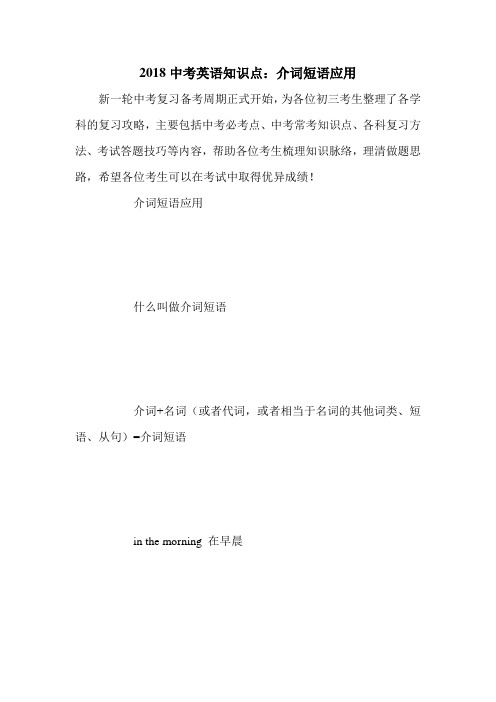
他到厨房里去。
三、位于句首表示突出、对照
In the garden everything was so beautiful.
花园里一切都是那么美丽。
四、位于句首,倒装主谓
Behind me lay the fields.
在我的后面是一片田野。
On the desk is a bag.
2018中考英语知识点:介词短语应用
新一轮中考复习备考周期正式开始,为各位初三考生整理了各学科的复习攻略,主要包括中考必考点、中考常考知识点、各科复习方法、考试答题技巧等内容,帮助各位考生梳理知识脉络,理清做题思路,希望各位考生可以在考试中取得优异成绩!
介词短语应用
什么叫做介词短语
介词+名词(或者代词,或者相当于名词的其他词类、短语、从句)=介词短语
because of由于
by means of以之手段
by way of作为
介词短语的位置
一、位于动词之后表示位置
She lives in Shanghai.
她住在上海。
The children are playing in the street now.
现在孩子们在街上玩。
二、位于动词之后表示方向
in the morning在早晨
under the tree在树下
from China来自中国
*注意区别介词短语和短语介词:
介词短语是(介词+名词性短语),可以单独作为句子成分;
短语介词是(一个相当于介词的短语),不能单独作为句子成分。
短语介词:
according to根据
a。
五、位于名词之后,用于限制前面的名词
初中英语2024届中考考点清单(代词+连词+形容词+数词+介词)
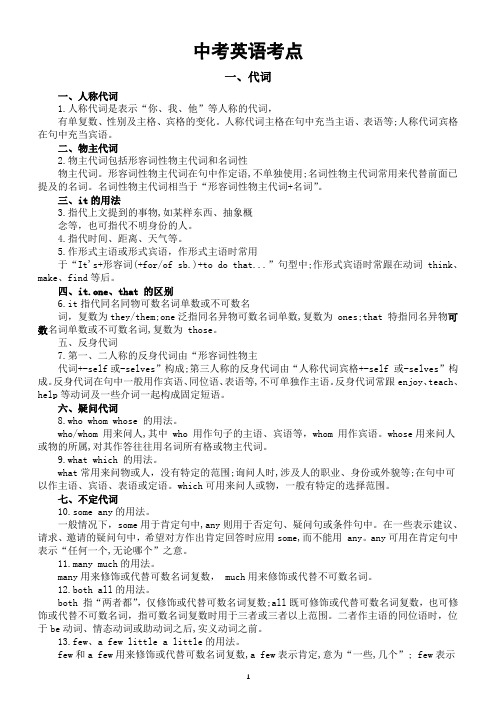
中考英语考点一、代词一、人称代词1.人称代词是表示“你、我、他”等人称的代词,有单复数、性别及主格、宾格的变化。
人称代词主格在句中充当主语、表语等;人称代词宾格在句中充当宾语。
二、物主代词2.物主代词包括形容词性物主代词和名词性物主代词。
形容词性物主代词在句中作定语,不单独使用;名词性物主代词常用来代替前面已提及的名词。
名词性物主代词相当于“形容词性物主代词+名词”。
三、it的用法3.指代上文提到的事物,如某样东西、抽象概念等,也可指代不明身份的人。
4.指代时间、距离、天气等。
5.作形式主语或形式宾语,作形式主语时常用于“It's+形容词(+for/of sb.)+to do that...”句型中;作形式宾语时常跟在动词 think、make、find等后。
四、it.one、that 的区别6.it指代同名同物可数名词单数或不可数名词,复数为they/them;one泛指同名异物可数名词单数,复数为 ones;that 特指同名异物可数名词单数或不可数名词,复数为 those。
五、反身代词7.第一、二人称的反身代词由“形容词性物主代词+-self或-selves”构成;第三人称的反身代词由“人称代词宾格+-self 或-selves”构成。
反身代词在句中一般用作宾语、同位语、表语等,不可单独作主语。
反身代词常跟enjoy、teach、help等动词及一些介词一起构成固定短语。
六、疑问代词8.who whom whose 的用法。
who/whom 用来问人,其中 who 用作句子的主语、宾语等,whom 用作宾语。
whose用来问人或物的所属,对其作答往往用名词所有格或物主代词。
9.what which 的用法。
what常用来问物或人,没有特定的范围;询问人时,涉及人的职业、身份或外貌等;在句中可以作主语、宾语、表语或定语。
which可用来问人或物,一般有特定的选择范围。
七、不定代词10.some any的用法。
中考英语语法专项代词介词知识点及练习
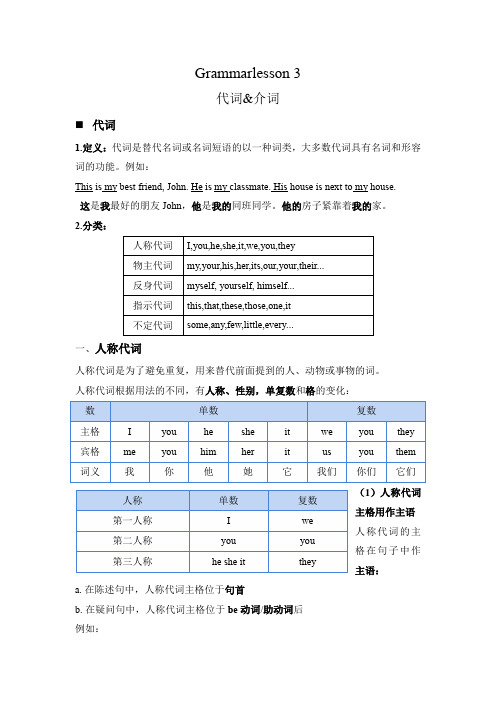
Grammarlesson 3代词&介词代词1.定义:代词是替代名词或名词短语的以一种词类,大多数代词具有名词和形容词的功能。
例如:This is my best friend, John. He is my classmate. His house is next to my house.这是我最好的朋友John,他是我的同班同学。
他的房子紧靠着我的家。
2.分类:一、人称代词人称代词是为了避免重复,用来替代前面提到的人、动物或事物的词。
人称代词根据用法的不同,有人称、性别,单复数和格的变化:(1)人称代词主格用作主语人称代词的主格在句子中作主语:a.在陈述句中,人称代词主格位于句首b.在疑问句中,人称代词主格位于be动词/助动词后例如:(2)人称代词宾格用作宾语人称代词宾格一般放在动词或介词后,作动词或介词的宾语: 例如:(3)多个人称代词同时出现的顺序a.单数( 2 3 1 ):第二人称,第三人称,第一人称 You, he and I should e back home now.b.复数( 1 23 ):第一人称,第二人称,第三人称 We, you and they like this film very much. (4)特殊用法二、物主代词1.物主代词的分类物主代词分为形容词性物主代词和名词性物主代词(1)形容词性物主代词形容词性物主代词相当于形容词,在句子中做定语,后接名词。
I would like to ask you where did you find your pen?This is my puter. Your puter is on Tom’s desk.(2)名词性物主代词a. 名词性物主代词相当于名词,在句中可做主语,表语和宾语等。
名词性物主代词=形容词性物主代词+名词My car is in front of the cinema. Hers is far from here.(做主语)These stamps are mine.(做表语)Our ideas are different from theirs.(做宾语)b.“of+名词性物主代词”的用法of+名词性物主代词相当于of+名词所有格短语,表示部分概念(......之一)。
2020-2021年中考英语分类汇编介词

2020-2021年中考英语分类汇编介词一、初中英语介词1.The earth goes _____ the sun.A. aroundB. throughC. betweenD. across【答案】A【解析】【分析】句意:地球绕着太阳转。
A. around围绕、环绕;B. through穿过,表示从事物内部穿过;C. between在…两者之间;D. across横穿,表示从事物外部一边到另一边。
根据句意“地球绕着太阳转。
”go around表示绕着......转,故答案为A。
【点评】考查介词辨析。
掌握介词意义和一些固定搭配的用法。
2.We will attend the junior high graduation ceremony ________ June 21st, 2019.A. inB. atC. on【答案】 C【解析】【分析】句意:在2019年6月21日我们将参加高中毕业典礼。
in用在年、月的名词前;介词at用在时间点前面,在具体的某个日期前用介词on,故选C。
【点评】此题考查介词用法。
掌握介词的使用规则。
3.On sunny days, my grandma often reads a novel ____ the window.A. byB. forC. withD. from【答案】 A【解析】【分析】句意:我奶奶经常在窗子旁边看小说。
by通过、被、在附近;for为、为了、对;with用、和……一起;from 来自,从……起,四者都是介词,根据句子结构可知此处是地点状语,by the window,在窗户旁边,故选A。
【点评】此题考查介词辨析。
根据句意确定句子中所使用的介词。
4.—When is your birthday, Li Fang?—It's _____________ July 26.A. onB. toC. in【答案】 A【解析】【分析】句意:——李芳,你的生日是什么时候?——是在7月26日。
- 1、下载文档前请自行甄别文档内容的完整性,平台不提供额外的编辑、内容补充、找答案等附加服务。
- 2、"仅部分预览"的文档,不可在线预览部分如存在完整性等问题,可反馈申请退款(可完整预览的文档不适用该条件!)。
- 3、如文档侵犯您的权益,请联系客服反馈,我们会尽快为您处理(人工客服工作时间:9:00-18:30)。
2020年中考英语专题复习——介词(真题)一、单选题(共50题;共100分)1. ( 2分) I always play basketball to relax myself _______ Saturdays.A. onB. inC. atD. by2. ( 2分) I've ordered some flowers for grandma and they will arrive _____ two hours.A. inB. afterC. overD. for3. ( 2分) Our classes are over noon and then we go to have a rest 1:00 in the afternoon.A. at; atB. in; inC. in; atD. at; in4. ( 2分) Happy birthday, Peter! Here's a gift you.A. forB. inC. withD. from5. ( 2分) Look at the picture on the right! She is going _______.A. into the libraryB. out of the post officeC. into the supermarket6. ( 2分) — What are you doing?—I'm looking the kids. They should be back for dinner now.A. afterB. atC. forD. up7. ( 2分) The program "I'm a Singer" is quite popular ______ students these days. They often talk about it between classes.A. forB. withC. in8. ( 2分) —Sally, it's already 10: 00 pm. It's time for you to go to bed.—OK. Dad. I'll turn ________ the TV right now.A. onB. downC. off9. ( 2分) Except for working hard, we should give more attention to proper exercise and enough sleep. , health always comes first.A. For exampleB. After allC. So far10. ( 2分) In China, we are using the FAST to find stars . Now more and more people want to know about the largest radio telescope(望远镜) in the world.A. in personB. in publicC. in space11. ( 2分) The earth goes _____ the sun.A. aroundB. throughC. betweenD. across12. ( 2分) Our class are much sure to win the basketball game ______ Class Three.A. ofB. inC. againstD. from13. ( 2分) —Excuse me, is there a computer room in your school?—Yes. It's ________ the fifth floor.A. onB. inC. atD. to14. ( 2分) —I'm thirsty. I'd like a glass of orange juice. What about you, Andy?—I prefer a cup of tea ______ nothing in it.A. withB. forC. toD. without15. ( 2分) Mum won't let Simon go out unless he promises to be back ______10 o' clock tonight.A. tillB. beforeC. asD. since16. ( 2分) Let's put the piano over there, __________ the wall.A. aboveB. againstC. acrossD. around17. ( 2分) Stephen Hawking was famous a scientist, he made a great contribution to the world, and he died March 14th, 2018.A. for; onB. as; inC. as; on18. ( 2分) convenient the way is! We can pay money scanning QR codes(二维码)in many shops.A. How; forB. How; byC. What; by19. ( 2分) In the picture, he sits ______me, looking very happy.A. besideB. amongC. upD. through20. ( 2分) More and more people in Qingdao go to work _________subway now.A. withB. onC. inD. by21. ( 2分) Don't stay inside such a sunny morning. Let's go out to enjoy the gentle wind and the sweet flowers.A. onB. inC. fromD. at22. ( 2分) —Bill, did you see Tom?—Yes, he just parked his car here and then hurried the street.A. throughB. overC. pastD. across23. ( 2分) —Who is the space scientist from Beijing?—The man______ white over there. He's of medium height.A. withB. inC. orD. for24. ( 2分) Karen and Lily will go to Russia to watch the 2018 World Cup ______ July.A. onB. inC. atD. of25. ( 2分) Frank is an independent boy. His parents are proud ____ him.A. onB. toC. inD. of26. ( 2分) Did you read your favorite books _____ April 23? It was World Book Day.A. forB. atC. onD. in27. ( 2分) Neil Armstrong was the first man to walk on the moon _______20 July 1969.A. inB. onC. atD. for28. ( 2分) I stopped _____the night in a small village while I was on holiday in the Himalayas a few years ago.A. atB. forC. untilD. through29. ( 2分) An earthquake happened in Songyuan, Jilin________ the morning of May28, 2018.A. onB. inC. at30. ( 2分) The Dragon Boat Festival falls_________ May or June every year.A. inB. onC. atD. between31. ( 2分) With an average temperature of 20 degrees, spring is___its way to Shanghai.A. onB. inC. ofD. by32. ( 2分) — The 32nd Olympic Games will be held in Tokyo _______ July 24th in 2020.— Yes. And it will be the second time to hold Olympic Games in Asia.A. onB. inC. atD. to33. ( 2分) — Look! A blind man is in the middle of the street. It's too dangerous.— Let's help him go the street.A. crossB. throughC. acrossD. along34. ( 2分) The girl is afraid of dark, so she goes to bed the lights on.A. withB. byC. forD. at35. ( 2分) All of us cleaned up the park yesterday ________ Tom beacause he was ill at home.A. exceptB. besidesC. withD. beside36. ( 2分) —I'm thirsty. I'd like a glass of mango jiuce. Would you like some, dad?—Oh, no. I prefer a cup of water________ nothing in it.A. withB. withoutC. forD. to37. ( 2分) Kids________130cm are for free rides in the public transport system.A. underB. belowC. overD. above38. ( 2分) The law prevents businessmen ________ buying and selling ivory, tooth of the elephant.A. byB. ofC. againstD. from39. ( 2分) —Jim, is physics difficult to learn?—Sure, but all subjects can be learned well hard work.A. forB. fromC. withD. through40. ( 2分) Ma Yun, Chairperson of Alibaba, has made much money the Internet.A. throughB. acrossC. byD. in41. ( 2分) —What's the weather like in Australia _______July?—It is winter there, so it's a little cold.A. inB. onC. atD. with42. ( 2分) The sunshine goes _______ the window and enlightens the dark room.A. throughB. acrossC. crossD. over43. ( 2分) He has an advantage ________ me, for he knows some French.A. beyondB. aboveC. overD. than44. ( 2分) Mr Right had to sell the house even though it was ________ his own wishes.A. belowB. overC. aboveD. against45. ( 2分) Bob lost his keys. So he jumped into the room _______ the window. Unfortunately, he hurt __________ badly.A. across; himselfB. through; himselfC. past; himD. over; him 46. ( 2分) — When does your first class begin?— ________ 8 o'clock.A. InB. OnC. AtD. For47. ( 2分) In order to keep cool, many people go swimming _______ summer.A. inB. atC. onD. to48. ( 2分) —Would you like some coffee?—Yes, and please get me some milk. I prefer coffee _________ milk.A. onB. toC. forD. with49. ( 2分) China has built a new Great Green Wall ___________ the north part of the country.A. amongB. acrossC. throughD. between50. ( 2分) Linda came back home half past ten last night.That's really too late.A. atB. onC. inD. for答案解析部分一、单选题1.【答案】A【考点】简单介词【解析】【分析】句意:我总是在周六打篮球来放松。
